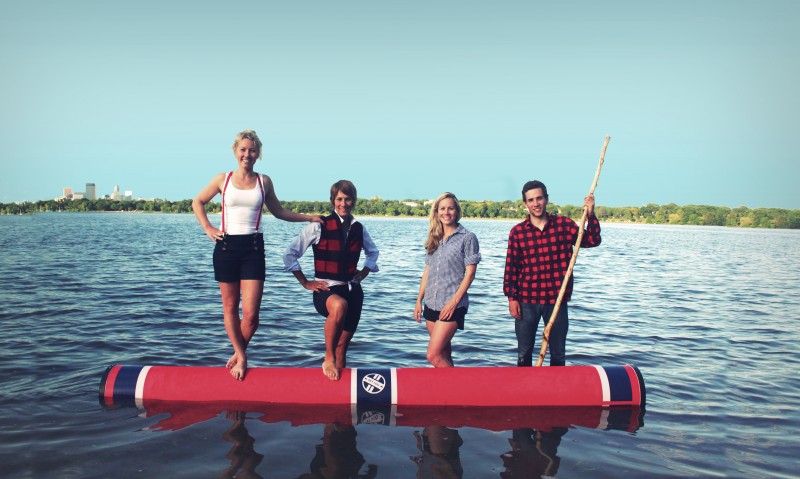
Abby Hoeschler's mother (second from left) is a seven-time logrolling world champion and was the reason her children became involved in the sport.
It was Abby Hoeschler’s mother who first influenced her to start logrolling.
“She grew up in northern Wisconsin and her mom [Hoeschler’s grandmother] signed her up for logrolling classes,” she said. “Log rolling was like summer camp there, and she ended up winning her first world championship at just 16.”
After starting to win competitions, her mom began teaching logrolling classes during high school. She loved promoting the sport and getting more people involved, Hoeschler said.
“She and my dad moved to southern Wisconsin, where he’s from, and she started a log rolling program there too—taught it to kids and families and brought me and my siblings along with her as soon as we could walk,” she said.
Because of this early exposure to the sport, Hoeschler and her siblings began competing as well and working their way up through the ranks. She followed in her mother’s footsteps and began teaching logrolling classes in middle school at the neighborhood pond, and eventually moving it to community pools when she was older.
Hoeschler and her sisters moved to Vermont to attend college, and her older sister decided to haul a 500-pound wood log with her to not only enjoy a sport she was accustomed to from home, but get others interested in log rolling as well. She said the result was that people were really intrigued by logrolling, and there were constantly people who wanted to learn more about it.
“But how are you going to get involved when that’s your equipment?” she said of the 500-pound log. “It was so hard to move. We always knew that the weight of the wood logs was hindering the growth of the sport.”
It was about eight years ago when Hoeschler and her family were trying to transport one of these logs to start a sister program in France when they realized it was illegal to ship raw cedar out of the United States. She said it was the straw that broke the camel’s back, and from then on they knew a synthetic version of the logs needed to be created.
When Hoeschler graduated from college, she decided to focus her attention on finding a solution.

Abby Hoeschler (right) teaching logrolling at the Outdoor Retailer Summer Market in Salt Lake City, Utah earlier this month.
“I was a history major and was entering into this really terrible job market,” she said. “We decided it was the right time, but all we had was this idea and we didn’t really know how to go about it. None of us were engineers, but everything kind of happened serendipitously.”
A friend suggested she get in contact with Mike Cichanowski, who is the founder and owner of Wenonah Canoe, saying how to develop a synthetic log was something he would be knowledgeable about because of the materials he uses to build canoes. By chance, she ended up running into him while on a Wisconsin trail, mentioning that the occurrence showed how small of a world we live in.
The other man who was with Cichanowski on the trail happened to have created carbon fiber violin bows.
“One of them made things that resembled wood and the other made things that float, so it was perfect,” Hoeschler said. “They put me in touch with two engineering students who did all of the math and came up with a prototype. We tested it out and it worked!”
This was in 2011 and she said the following year was spent refining the Key Log product with the engineers, Austin Erdenberger and Calvin Skiem, from Winona State University. Once the mold for the Key Log was made and they figured out how to manufacture it, the process came full circle and Cichanowski became involved in the assembly part of the business.
Hoeschler said since the product has been developed, the team has received an extremely enthusiastic response. After beginning the promotion of the Key Log, they found out that summer camps would be one of their biggest markets.
“The camp counselors are really willing to learn new things,” Hoeschler said. “Logrolling is easier to teach, so we take the counselors out and do a one-day training and by the end of the day they’re able to log roll and teach others.”
Another market she said they’ve gotten a lot of feedback from is the shops that rent out equipment for water activities such as SUP, kayaking, and canoeing.
“It’s still really new to people, so the product is an investment for these retail shops. They all say it’s a great way to bring people into the store,” she said. “It’s such a draw, because with SUPs and kayaks, there’s typically one for each person, where you leave the beach and go out on your own. But with the Key Log, the action is right there at the beach and it’s really social. It’s a great spectator sport, really competitive, and a great core workout.”
She said the biggest innovation is taking this 500-pound log and turning it into a 65-pound one, with added features such as training paddle wheels that slow the logrolling down so beginners are able to learn.
“We really just wanted to grow the sport. We didn’t go into it for just profit.” Hoeschler said. “Our long term goal is to have it in the Olympics, but this is the first time the sport has really made any sort of advancement in technology.
For more information about the company or to purchase a log, visit the Key Log Rolling website.
Images courtesy of Abby Hoeschler
 Your Privacy Choices
Your Privacy Choices
 The
The